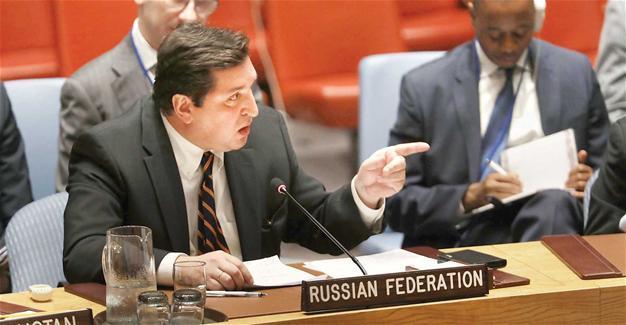Trump says US, Russia ties are at ‘all-time low’
WASHINGTON

U.S. ties with Russia are at an “all-time low” due to Syria, President Donald Trump has said, adding that they want to improve ties with their Cold War enemy.
“Right now, we’re not getting along with Russia at all – we may be at an all-time low in terms of our relationship with Russia,” Trump said alongside NATO Secretary-General Jens Stoltenberg at the White House on April 12.
Moscow has accused the United States of breaking international law by striking Syria with 59 Tomahawk cruise missiles on April 7 in what Trump said was retaliation for a chemical attack on a rebel-held town attributed to the Syrian regime of President Bashar al-Assad.
Trump has given such criticism short shrift, decrying the “vicious slaughter of innocent civilians with chemical weapons” and calling al-Assad a “butcher” and an “animal.”
“I felt we had to do something about it. I have absolutely no doubt we did the right thing,” he said.
“It would be wonderful... if NATO and our country could get along with Russia,” Trump said, trying to show his intention of wanting to mend ties.
But that prospect appeared remote, with Trump’s secretary of state, Rex Tillerson, getting a frosty reception in Moscow, and Russia using its U.N. Security Council veto to swat down a U.S.-backed resolution demanding Syrian cooperation in probing last week’s suspected sarin attack in the town of Khan Sheikhoun, which killed 87 civilians.
Trump added it was “certainly possible” that Moscow knew about the alleged chemical attack, indicating Russian officials were present at the source air base that Trump later bombed.
Russian President Vladimir Putin made his displeasure felt as he hosted Tillerson at the Kremlin on April 12.
“There is a low level of trust between our two countries. The world’s two foremost nuclear powers cannot have this kind of relationship,” Tillerson, who once received a medal of friendship from Putin, told a Moscow news conference.
Russian Foreign Minister Sergei Lavrov agreed there were many problems, but stressed that Moscow was “open to dialogue with the U.S. in all different areas.” He noted a shared vision of an “uncompromising” war on terrorism.
But neither side cited concrete avenues of cooperation, beyond establishing a working group to address what Tillerson called “smaller issues.”
The polarized positions were evident at the U.N. Security Council on April 12, when Russia vetoed a Western-drafted resolution that would have required Syrian cooperation in an investigation into the suspected chemical attack and the condemnation of the attack.
It was the eighth time that Russia has used its veto power to block action directed at Damascus. China opted to abstain, a move Trump praised.
British Foreign Secretary Boris Johnson said the veto “puts Russia on the wrong side of the argument,” while French President François Hollande warned Russia it “bears a heavy responsibility” for continuing to protect al-Assad.
“After today’s vote to hold Syria accountable it’s: A strong day for the U.S., a weak day for Russia, a new day for China & doomsday for Assad,” the U.S. ambassador to the UN, Nikki Haley, said on Twitter.
Russia’s U.N. ambassador, Vladimir Safronkov, told the council before the vote that a resolution was unnecessary, and the draft put forward by the Western powers pre-judged that the Syrian government was responsible for the April 4 attack.
Safronkov said Lavrov asked Tillerson during talks earlier on April 12 in Moscow to jointly request the Organization for the Prohibition of Chemical Weapons (OPCW) “to immediately put together an independent international mission” to visit Khan Sheikhoun and the air base that the U.S. attacked in retaliation. Tillerson is considering the request, he said, “and we expect that Washington will have a constructive reaction.”
 U.S. ties with Russia are at an “all-time low” due to Syria, President Donald Trump has said, adding that they want to improve ties with their Cold War enemy.
U.S. ties with Russia are at an “all-time low” due to Syria, President Donald Trump has said, adding that they want to improve ties with their Cold War enemy.